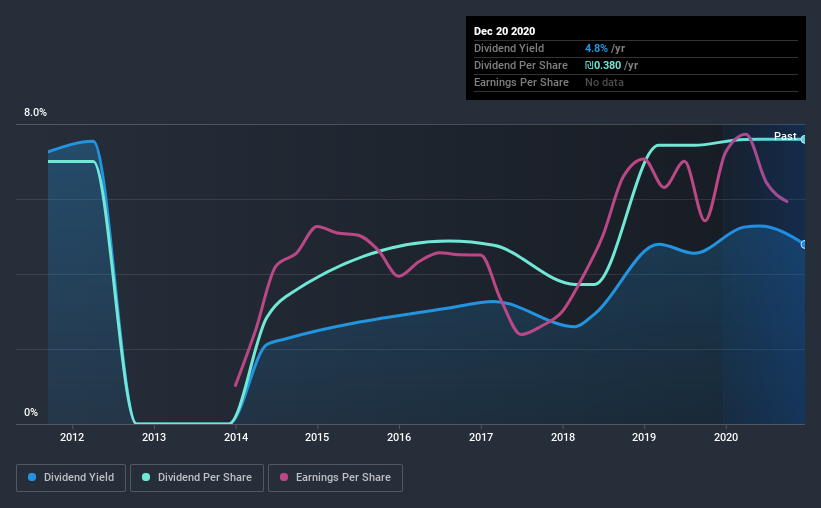Is Bank of Jerusalem Ltd. (TLV:JBNK) A Smart Pick For Income Investors?

Today we'll take a closer look at Bank of Jerusalem Ltd. (TLV:JBNK) from a dividend investor's perspective. Owning a strong business and reinvesting the dividends is widely seen as an attractive way of growing your wealth. Yet sometimes, investors buy a popular dividend stock because of its yield, and then lose money if the company's dividend doesn't live up to expectations.
With a goodly-sized dividend yield despite a relatively short payment history, investors might be wondering if Bank of Jerusalem is a new dividend aristocrat in the making. It sure looks interesting on these metrics - but there's always more to the story. Some simple research can reduce the risk of buying Bank of Jerusalem for its dividend - read on to learn more.
Explore this interactive chart for our latest analysis on Bank of Jerusalem!

Payout ratios
Dividends are typically paid from company earnings. If a company pays more in dividends than it earned, then the dividend might become unsustainable - hardly an ideal situation. As a result, we should always investigate whether a company can afford its dividend, measured as a percentage of a company's net income after tax. Bank of Jerusalem paid out 16% of its profit as dividends, over the trailing twelve month period. We'd say its dividends are thoroughly covered by earnings.
Remember, you can always get a snapshot of Bank of Jerusalem's latest financial position, by checking our visualisation of its financial health.
Dividend Volatility
One of the major risks of relying on dividend income, is the potential for a company to struggle financially and cut its dividend. Not only is your income cut, but the value of your investment declines as well - nasty. The first recorded dividend for Bank of Jerusalem, in the last decade, was nine years ago. Although it has been paying a dividend for several years now, the dividend has been cut at least once, and we're cautious about the consistency of its dividend across a full economic cycle. During the past nine-year period, the first annual payment was ₪0.3 in 2011, compared to ₪0.4 last year. Its dividends have grown at less than 1% per annum over this time frame.
We're glad to see the dividend has risen, but with a limited rate of growth and fluctuations in the payments, we don't think this is an attractive combination.
Dividend Growth Potential
With a relatively unstable dividend, it's even more important to see if earnings per share (EPS) are growing. Why take the risk of a dividend getting cut, unless there's a good chance of bigger dividends in future? Bank of Jerusalem has grown its earnings per share at 5.0% per annum over the past five years. With a decent amount of growth and a low payout ratio, we think this bodes well for Bank of Jerusalem's prospects of growing its dividend payments in the future.
Conclusion
To summarise, shareholders should always check that Bank of Jerusalem's dividends are affordable, that its dividend payments are relatively stable, and that it has decent prospects for growing its earnings and dividend. Firstly, we like that Bank of Jerusalem has a low and conservative payout ratio. Second, earnings growth has been ordinary, and its history of dividend payments is chequered - having cut its dividend at least once in the past. Bank of Jerusalem might not be a bad business, but it doesn't show all of the characteristics we look for in a dividend stock.
Companies possessing a stable dividend policy will likely enjoy greater investor interest than those suffering from a more inconsistent approach. Still, investors need to consider a host of other factors, apart from dividend payments, when analysing a company. For instance, we've picked out 1 warning sign for Bank of Jerusalem that investors should take into consideration.
Looking for more high-yielding dividend ideas? Try our curated list of dividend stocks with a yield above 3%.
If you decide to trade Bank of Jerusalem, use the lowest-cost* platform that is rated #1 Overall by Barron’s, Interactive Brokers. Trade stocks, options, futures, forex, bonds and funds on 135 markets, all from a single integrated account. Promoted
Valuation is complex, but we're here to simplify it.
Discover if Bank of Jerusalem might be undervalued or overvalued with our detailed analysis, featuring fair value estimates, potential risks, dividends, insider trades, and its financial condition.
Access Free AnalysisThis article by Simply Wall St is general in nature. It does not constitute a recommendation to buy or sell any stock, and does not take account of your objectives, or your financial situation. We aim to bring you long-term focused analysis driven by fundamental data. Note that our analysis may not factor in the latest price-sensitive company announcements or qualitative material. Simply Wall St has no position in any stocks mentioned.
*Interactive Brokers Rated Lowest Cost Broker by StockBrokers.com Annual Online Review 2020
Have feedback on this article? Concerned about the content? Get in touch with us directly. Alternatively, email editorial-team@simplywallst.com.
About TASE:JBNK
Proven track record with adequate balance sheet.
Market Insights
Community Narratives



